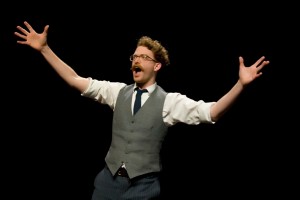
There are four of us, I think. Five if you include Eddie. One is Colin (more on him here). Colin falls happily asleep early on. I keep looking round to see if the other two in the audience are enjoying it as much as me.
The play is Botallack O’Clock. It’s September 2011 and Third Man Theatre have taken a risk and brought their newest show to us en route from Cornwall to London. It’s a solo show with two actors, biographical, absurd, brilliantly bizarre. It explores the work of Roger Hilton, the production’s style reflecting the artist’s work. The play is performed once more in Exeter – this time in front of an audience ten times the size – word of mouth having spread as three quarters of the audience shouted the productions praises.
Indeed, those who’ve seen Eddie’s work and liked it, always tend to rave about it. Third Man were the first company to undertake a Bike Shed residency, during which they began early development on Mugs Arrows, which in turn was performed in Exeter the following year. Few liked the play. Some hated it. Most, though, loved it. The absurdity this time applied to directionless thirty-somethings playing darts following the wedding of their old friend. Blue paint, karaoke, goats and patatas gravitas combined to present the gnawing emptiness of being a grown up without having really done anything, of a world moving on without you.
Thought of by the team at the Bike Shed as one of the family (probably the cool uncle who lives in Cambodia and shows up every other Christmas), Eddie is always a gloriously welcome presence in the Bike Shed – dancing, drinking, talking. His next piece, concerning Nicky Reilly, the man who failed to blow up the Giraffe restaurant in Exeter in 2008, will begin development later this year (funding permitting) – whilst Botallack O’Clock is currently getting a rerun in London at the funky-and-even-more-intimate-than-the-Bike-Shed Old Red Lion in London. If you get a chance, see it.
 We’d been open barely a week when Val paid her first visit. She hadn’t been invited, as others had. She’d sought us out and wanted to find out for herself.
We’d been open barely a week when Val paid her first visit. She hadn’t been invited, as others had. She’d sought us out and wanted to find out for herself.






